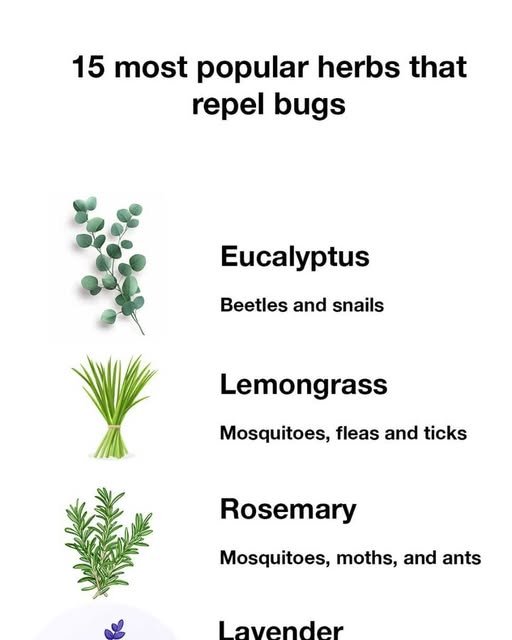In the quest for natural solutions to keep bugs at bay, herbs have emerged as a popular choice. These plants not only add flavor to our dishes but also possess unique properties that can deter a variety of insects. From mosquitoes to flies, certain herbs can help create a bug-free environment, making them a valuable addition to gardens and homes. This article explores 15 of the most popular herbs known for their bug-repelling abilities, offering insights into how they work and how you can use them effectively.
Understanding How Herbs Repel Bugs
Herbs repel bugs through their natural oils and compounds, which can interfere with the sensory receptors of insects. These compounds, such as essential oils, emit strong scents that are pleasant to humans but overwhelming or unpleasant to bugs. For example, the menthol in peppermint is known to repel mosquitoes, while the camphor-like scent of rosemary can deter a variety of pests. By understanding the specific compounds and mechanisms, we can better utilize these herbs to protect our spaces from unwanted insects.
Basil: The Fragrant Protector
Basil is not just a culinary delight but also a powerful insect repellent. Its strong scent is effective against mosquitoes and flies. Basil contains essential oils like estragole and linalool, which are known to repel insects. Planting basil near doorways or windows can help keep bugs out, and crushing the leaves releases more of its potent aroma, enhancing its protective effect.
Lavender: The Calming Bug Deterrent
Lavender is renowned for its calming properties, but it also serves as an excellent bug deterrent. The soothing scent of lavender is disliked by mosquitoes, moths, and fleas. Its essential oil contains linalool and linalyl acetate, which are effective in repelling insects. Planting lavender in gardens or using sachets indoors can help maintain a bug-free environment while adding a touch of tranquility.
Peppermint: The Refreshing Insect Repellent
Peppermint is a refreshing herb that doubles as an insect repellent. Its high menthol content makes it effective against mosquitoes, ants, and spiders. The strong scent of peppermint can mask the odors that attract pests, making it a versatile choice for repelling a variety of insects. Peppermint oil can be used in sprays or diffusers to enhance its bug-repelling properties.
Rosemary: The Aromatic Shield
Rosemary is an aromatic herb that offers a natural shield against insects. Its woody scent is effective in repelling mosquitoes and other flying insects. Rosemary contains camphor and cineole, compounds known for their insect-repelling properties. Growing rosemary in gardens or using its essential oil can help create a protective barrier against bugs.
Lemongrass: The Citrus-Scented Barrier
Lemongrass is well-known for its citrus scent, which is a natural deterrent for mosquitoes. The herb contains citral and geraniol, compounds that are effective in repelling insects. Lemongrass can be planted around the home or used in oil form to create a barrier against bugs. Its refreshing aroma also makes it a popular choice for outdoor spaces.
Thyme: The Versatile Bug Fighter
Thyme is a versatile herb that not only enhances culinary dishes but also fights off insects. The herb contains thymol, a compound with strong insect-repelling properties. Thyme is particularly effective against mosquitoes and can be used in gardens or as an essential oil to keep bugs at bay. Its robust scent makes it a reliable choice for natural pest control.
Sage: The Earthy Insect Deterrent
Sage is an earthy herb that serves as an effective insect deterrent. Its strong aroma is disliked by mosquitoes and flies. Sage contains compounds like cineole and camphor, which contribute to its bug-repelling abilities. Burning sage leaves or using them in sachets can help protect indoor and outdoor spaces from insects.
Mint: The Cool Bug Buster
Mint is a cool and refreshing herb that acts as a bug buster. Its strong menthol scent is effective against mosquitoes, ants, and flies. Mint can be planted in gardens or used in essential oil form to create a natural insect repellent. Its fast-growing nature makes it an easy and effective choice for keeping bugs away.
Catnip: The Surprising Mosquito Repellent
Catnip is often associated with feline enjoyment, but it also serves as a surprising mosquito repellent. The herb contains nepetalactone, a compound that is highly effective in deterring mosquitoes. Studies have shown that catnip can be more effective than some commercial insect repellents. Planting catnip in gardens or using its oil can help keep mosquitoes at bay.
Garlic: The Pungent Pest Controller
Garlic is a pungent herb that acts as a powerful pest controller. Its strong odor is effective in repelling mosquitoes, ticks, and other insects. Garlic contains sulfur compounds that are unpleasant to bugs. Crushing garlic cloves and placing them around the home or garden can create a natural barrier against pests.
Oregano: The Herbaceous Bug Blocker
Oregano is a herbaceous herb that doubles as a bug blocker. Its strong scent is effective against mosquitoes and other insects. Oregano contains carvacrol and thymol, compounds known for their insect-repelling properties. Growing oregano in gardens or using its essential oil can help protect spaces from unwanted bugs.
Bay Leaves: The Subtle Insect Shield
Bay leaves offer a subtle yet effective insect shield. Their aroma is disliked by flies, moths, and roaches. Bay leaves contain lauric acid, which contributes to their bug-repelling abilities. Placing bay leaves in pantry areas or using them in sachets can help keep insects at bay while adding a pleasant scent to the home.
Fennel: The Sweet-Scented Protector
Fennel is a sweet-scented herb that serves as a protector against insects. Its licorice-like aroma is effective in repelling fleas and aphids. Fennel contains anethole, a compound that contributes to its insect-repelling properties. Planting fennel in gardens or using its seeds can help create a natural barrier against bugs.
Citronella: The Classic Mosquito Repellent
Citronella is a classic mosquito repellent known for its strong citrus scent. The herb contains citronellal and geraniol, compounds that are highly effective against mosquitoes. Citronella is often used in candles and oils to create a protective barrier against insects. Its refreshing aroma makes it a popular choice for outdoor gatherings.
Conclusion: Choosing the Right Herb for Your Needs
Choosing the right herb for repelling bugs depends on the specific insects you want to deter and the environment in which you plan to use them. Consider the scent, growing conditions, and effectiveness of each herb to find the best fit for your needs. Whether you’re looking to protect your garden, home, or outdoor spaces, these herbs offer natural and effective solutions for keeping bugs at bay. By incorporating these herbs into your environment, you can enjoy a bug-free space while benefiting from their aromatic and culinary qualities.



